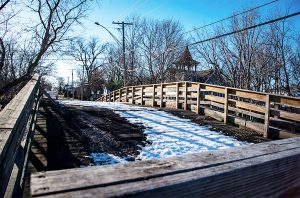Richmond’s deteriorating wooden bridge now an endangered historic site
June 3, 2023
A historic wooden bridge in Richmond has been closed since the 1990s and is suffering from deterioration and neglect according to Landmarks Illinois, a Chicago-based preservation group. (Photo by Alex Wiezbicki (IG) ajw_outdoor_photography via Landmarks Illinois).
A historic wooden bridge in Richmond faces possible demolition by neglect.
The historic span, located on George Street between Main and Charles streets, is the last of two wooden bridges built in the mid-1800s over a railroad line and helped connect two parts of the McHenry County community.
But a lack of maintenance and no plan to preserve it mean that the bridge faces more deterioration and destruction, according to Landmarks Illinois, a preservation agency that recently highlighted the span as among the state’s most endangered properties.
“Benign neglect is an insidious and all-too-common way that communities lose their heritage,” said Allison Kessel Clark of the Richmond-based W.A. McConnell Foundation. “Through lack of attention and basic maintenance, irreplaceable history can be lost forever. Richmond’s Historic Wooden Bridge is quietly suffering this fate.”
Landmarks Illinois also recently called attention to nine culturally and architecturally significant sites across the state that face growing threats of disinvestment and demolition.
Richmond, also known as the Village of Yesteryear, is a historic town settled in 1837 by pioneer William McConnell. The old wooden bridge is the last survivor of two bridges from Richmond’s frontier past, which connected the halves of the community bisected by the railway.
The remaining bridge, a longstanding fixture in the community and now owned by the village, is integral to Richmond’s identity. It, along with its twin lost in the 1980s, remains part of the town’s logo. Today, Richmond has a rich historic presence with unique shops, numerous original Victorian houses, churches and a thriving Main Street.
Restoring the bridge would enhance the village’s historic charm.
“With dedicated attention and upkeep, our hope is that Richmond’s Historic Wooden Bridge will live on for future generations and serve as a gateway project, opening doors and minds to the value and importance of the many historic structures all over the Richmond, Illinois area,” Clark said.
The McConnell Foundation recently highlighted village attention to the bridge in a Facebook post with workers removing debris and doing general cleanup.
The wooden bridge was closed to traffic in the early 1990s due to poor conditions. Landmarks Illinois called for an official landmark designation and more widespread education on this structure.
“This landmark can be revitalized as a designated meeting spot for townspeople and tourists by being repurposed as a safe and attractive pedestrian bridge — as a walking gateway to enjoy a coffee, to rest from the bicycle path below, to take photographs or to meet friends for a walk,” Landmarks Illinois said on its website. “The City of Richmond should work with the W.A. McConnell Foundation and provide the necessary resources to address the deferred maintenance to ensure the bridge’s longevity.”
To support the renovation of Richmond’s Wooden Bridge, contact: Foundation@WAMcConnellFoundation.org







